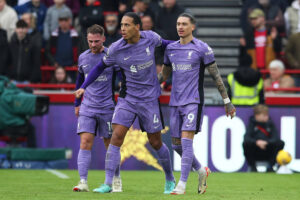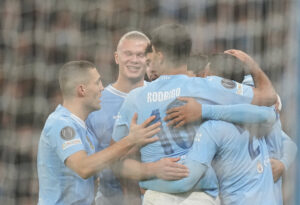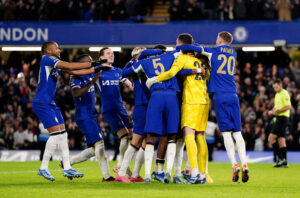In the third of our new series, The Greatest: The Players, Managers and Matches That Made Arsenal, our resident football historian, Martin Keady, looks back at the greatest match in Arsenal’s history – Anfield 89.
Anfield 89, when Arsenal won the league title with the last kick of the last game of the season, is undoubtedly the greatest match in Arsenal’s history. The only match in the club’s history that comes close to it is one from the distant past and one that was not even an Arsenal match, even though it took place at Arsenal’s famous old stadium, Highbury. That was the fabled ‘Battle of Highbury’ in 1934 when an England XI with seven Arsenal players defeated the reigning world champions, Italy. It was an unofficial decider to determine the best football team on the planet because England had been so convinced of their superiority that they did not even bother to enter the World Cup in Italy earlier that year. However, even the elation of ‘winning the World Cup’, as many Arsenal fans claimed the club had done after England’s 3-2 win over Italy, could not compare with the joy of Anfield 89, and it is doubtful that anything ever can.
The Players, Managers and Matches That Made Arsenal. No.3 – Anfield 89
Modern Accounts
It is a testament to the importance of Anfield 89 that it has produced virtually its own canon of books, films and other records of it. First, of course, there was Fever Pitch (or ‘The Bible’, as Arsenal fans often refer to it), Nick Hornby’s sublime account of his own experience of growing up an Arsenal fan, culminating in that victory in Liverpool. As Hornby memorably put it in Fever Pitch, winning the league at Anfield was better than sex, because if you were a reasonably healthy individual and “ate your greens”, you could easily have sex once or more every night, whereas the title-clincher at Anfield was definitively a once-in-a-lifetime event. (Incidentally, Hornby’s line was actually improved upon later by the brilliant Brian Clough, who said of Arsène Wenger’s 2004 Invincibles that to be an Arsenal fan watching them must be “better than heaven”.)
Hornby’s era-defining book was followed by, among others, Jason Cowley’s memoir, The Last Game: Love, Death and Football, in which the eminent journalist argued that Anfield 89 marked the end of the old English game and effectively set in motion the train of events that culminated in the formation of the Premier League less than three years later.
In addition to the books about Anfield 89, there are also the films, and not just the screen adaptation of Fever Pitch. There is also the recent documentary, 89 – How Arsenal Did The Impossible, whose subtitle sums up the scale of Arsenal’s achievement in winning that match and with it the title. And, of course, there are all the television and radio commentaries and programmes about the match, most famously, of course, Brian Moore’s immortal line on ITV’s The Big Match Live, with which he perfectly cued up Michael Thomas’ last-second winner: “It’s up for grabs now!” For Arsenal fans, it is the club equivalent of Kenneth Wolstenholme’s famous line at the end of England’s 1966 World Cup triumph: “They think it’s all over…It is now!”
Not to Be Beaten
When Manchester City won the Premier League title at home in 2012 with the famous late goal from “Aguerooooo!” that turned a 2-1 deficit to Queens Park Rangers as they entered extra time into a 3-2 match and title-winning lead, many City fans, football writers and pundits compared it to Arsenal’s achievement in winning 2-0 at Liverpool in 1989. In truth, though, City’s achievement is absolutely dwarfed by Arsenal’s, and to compare the two is to compare a dripping tap to Niagara Falls. City nearly blew what should have been a straightforward home win against a relegation-threatened side, and one that arguably relaxed at the end of the match after they knew that Bolton Wanderers’ defeat had already secured their Premier League status. By contrast, Arsenal beat the side that had completely dominated English football, and to a large extent European football, for more than a decade and a half, and did not just do so narrowly but by the required margin of two clear goals, something that most people, including most Arsenal fans, had thought was absolutely impossible before the game began.
That is why Anfield 89 deserves comparison not with City 2012 but with the other greatest away victories in the history of world football, such as the one that is arguably the greatest of them all, and the international equivalent of Anfield 89. That is Uruguay’s 2-1 victory over Brazil in the 1950 World Cup final in Rio de Janeiro, in front of a world record crowd estimated at the time to be nearer 200,000 people than the Maracana’s official attendance of 100,000. Alternatively, a more recent comparison can be made with another triumph in the club game, when Deportivo La Coruna won the Spanish Cup final against Real Madrid at the Bernabeu in 2002, a hundred years after Real were founded, beating the original Galacticos of Zinedine Zidane, Luis Figo and Roberto Carlos, who would go on to win the European Cup just a few months later, on their home ground. However, impressive as those two historic victories are (and they are undeniably impressive), it must also be pointed out that they were victories in cup competitions, whereas Anfield 89 was the culmination of a season-long league battle between the two best teams in that league.
Of course, the reason why Anfield 89 was the last game of the season was Hillsborough. That was the worst ever disaster in the history of English football, when 96 Liverpool fans were crushed to death at the FA Cup semi-final against Nottingham Forest, after police had foolishly – criminally, in fact, as was established long afterwards – allowed the Leppings Lane end of Sheffield Wednesday’s ground to become horribly overcrowded. The result was that nearly a hundred men, women and children were killed when they were forced up against the fences that were supposed to stop fans from getting on to the pitch.
As a result of that genuine footballing disaster, there was a major interruption to the end of the English domestic season, such that Liverpool’s home game against Arsenal was rearranged to the end of May, after the FA Cup final that Liverpool had already won against local rivals Everton. And so, buoyed up by that Wembley victory and a feeling that they would also win the league as some small tribute to their fallen fans, it seemed that Liverpool could not be beaten against Arsenal at home, especially when they could afford to lose by a single goal and still win the title on goal difference.
A Non-Football Comparison
In that respect, perhaps the closest comparison to Anfield 89 in all of sport is not with other football matches but with the famous ending of the 2001 World Series in baseball. That season-ending finale saw the New York Yankees face the Arizona Diamondbacks less than two months after the 9/11 attacks that had destroyed the Twin Towers in New York City and killed nearly 3,000 people. As a result, the Yankees, who are almost always the most hated team in America because of their domination of their sport, were for once being willed on by the rest of America, to win the World Series in memory of those who had lost their lives only six or seven weeks earlier. But Arizona still beat the Yankees, despite the huge groundswell of support for the New York team.
Similarly, in May 1989, when Liverpool faced Arsenal at Anfield, although Liverpool were even more dominant in English football at the time than the Yankees had been in baseball at the turn of the millennium, almost all of English football outside of Arsenal and their fans were willing them on to win the title and clinch the double. That was the scale of the task facing Arsenal that night as they ran out at Liverpool’s ground.
Up to It
However, from the very first moment that the Arsenal players showed that they were up to both the footballing challenge and, even more importantly, the emotional challenge that was ahead of them. Led by captain Tony Adams, they laid flowers in memory of the victims of Hillsborough, not as some cynical attempt to try and silence the Anfield crowd but in a genuinely heartfelt tribute to other football lovers who had lost their lives at a football match less than two months earlier.
The reaction of the Anfield crowd that night must not be forgotten in the celebration of Arsenal’s achievement. They applauded Adams and his team for their initial gesture at the start of the game and then, even more remarkably, they applauded them off the pitch at the end of the game, even though the Arsenal players had denied them the double that had seemed the smallest of consolations at the end of the most traumatic of seasons.
It is for that reason, as much as for the sporting achievement of Arsenal’s players that night, that Anfield 89 is undoubtedly the greatest match in the Gunners’ history. It won the them the title, but even more importantly it set them on the path to what might justifiably be called “The Silver Age” of Arsenal, when the club won five titles in 15 years between 1989 and 2004 (two under George Graham and three under Arsène Wenger), which was the most sustained period of success in Arsenal’s history since their true Golden Age of the 1930s. That is why whatever happens in the future – even the realisation, unlikely as it seems now, of Arsenal fans’ dreams that their club will one day win the Champions League – it is almost impossible that any Arsenal match anywhere will ever top Anfield 89.
Main Photo






